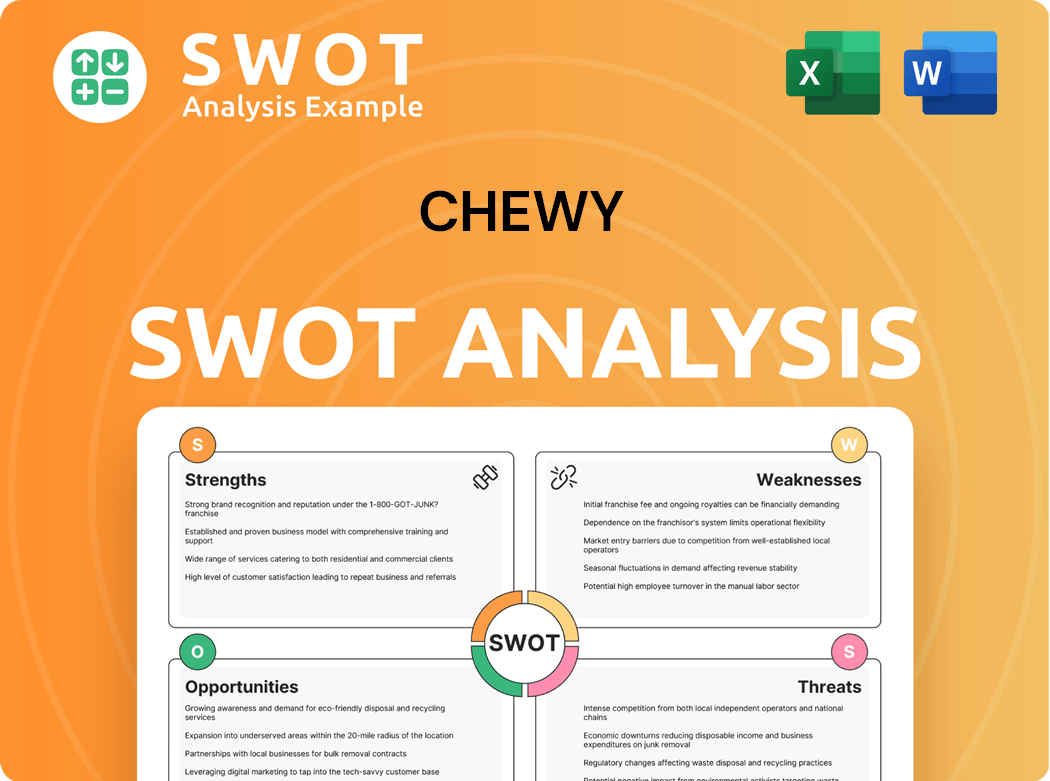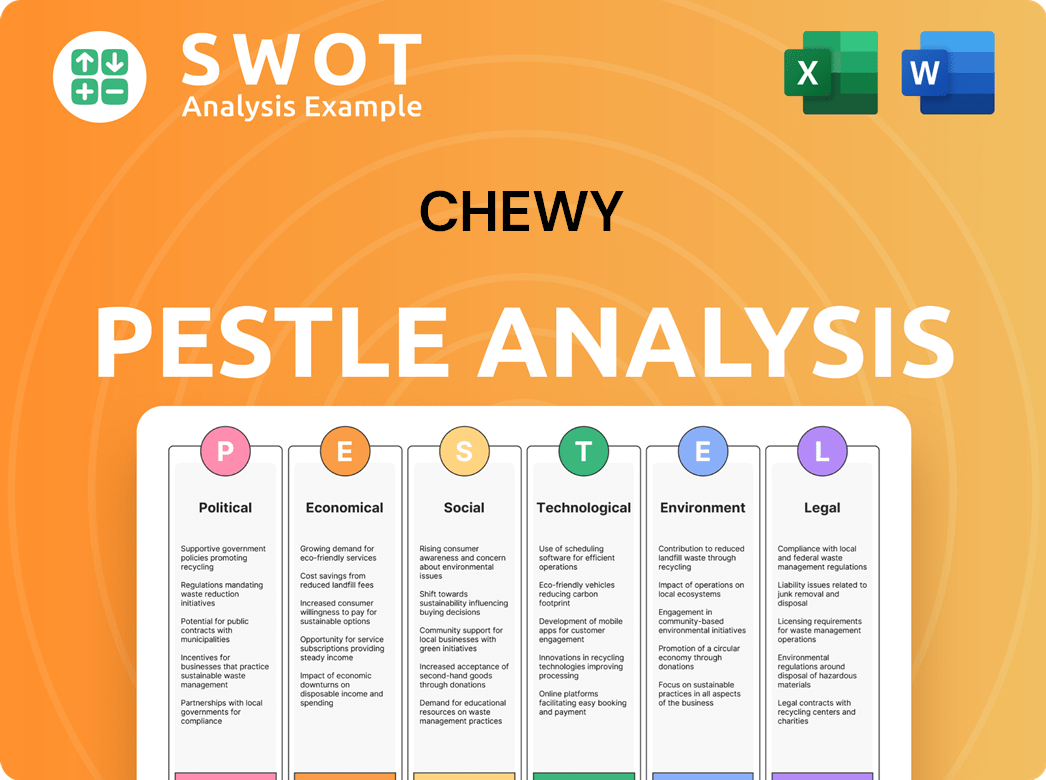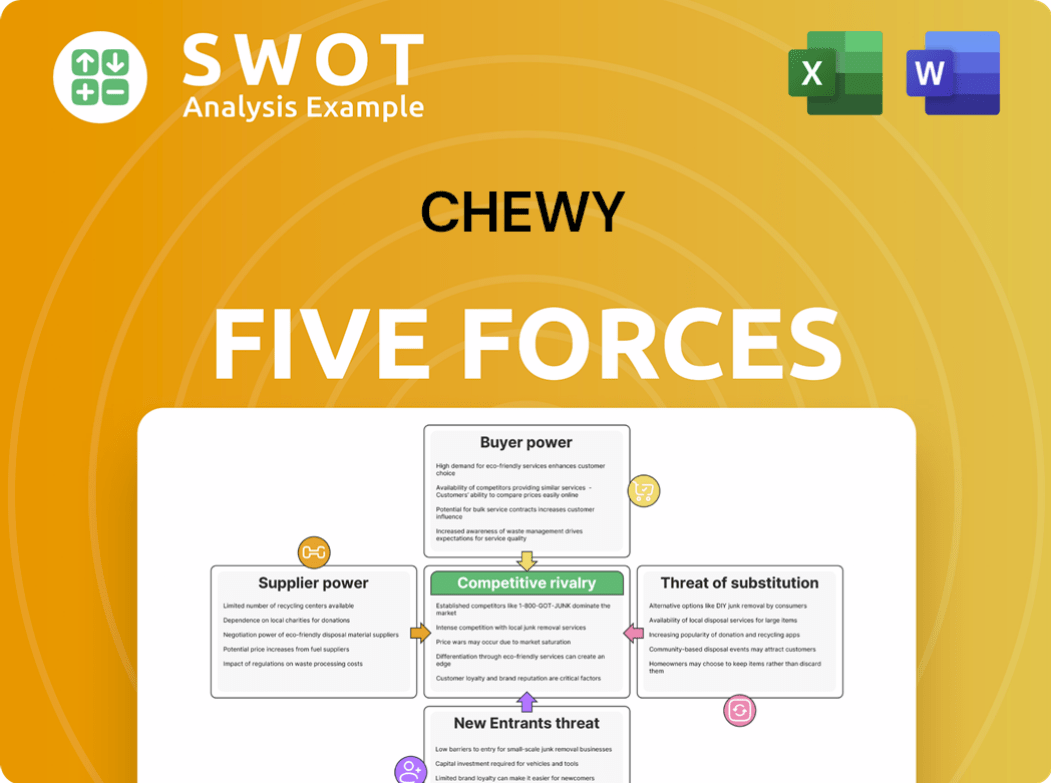Chewy Bundle
How Did Chewy Revolutionize the Pet Supply Industry?
Chewy, Inc. has swiftly transformed the pet care landscape, becoming a go-to for pet owners everywhere. From its inception, Chewy aimed to redefine how we purchase essentials for our furry, scaled, and feathered friends. This article explores the fascinating journey of Chewy, detailing its rise from a startup to a dominant force in the Chewy SWOT Analysis.

The Chewy company story began with a simple mission: to provide exceptional customer service and a vast selection of pet supplies online. Understanding the Chewy history means exploring the innovative Chewy online business model and its impact on the market. We'll also examine key milestones, including the PetSmart acquisition, and how Chewy continues to adapt and thrive.
What is the Chewy Founding Story?
The story of the Chewy company began in September 2011. It was founded by Ryan Cohen and Michael Day. Their vision was to revolutionize the pet supply market.
Both founders brought unique skills to the table. Ryan Cohen, with his e-commerce background, and Michael Day, combined their expertise to address a gap in the market. They focused on making it easier for pet owners to buy supplies online.
The company's initial goal was to solve the problems pet owners faced when purchasing supplies. This included the inconvenience of buying heavy items and the lack of personalized service. Chewy aimed to offer a better experience.
Chewy's early business model centered on an online platform. It offered a wide range of pet food, treats, and supplies. The company distinguished itself through exceptional customer service.
- Chewy's e-commerce platform provided a vast selection of pet products.
- Customer service was a key differentiator, with personalized interactions.
- Handwritten holiday cards were part of Chewy's early customer service strategy.
- Initial funding came from the founders, friends, and family, followed by venture capital.
The name 'Chewy' was chosen for its pet-friendly appeal. It reflected the company's focus on pets. The company's early success laid the groundwork for its future growth.
In its early years, Chewy focused on building a strong customer base. They provided a wide selection of products. Chewy's commitment to customer service helped it stand out in the online pet store market. This strategy proved successful, as the company grew rapidly.
In 2017, PetSmart acquired Chewy for approximately $3.35 billion. This acquisition marked a significant milestone. It highlighted the company's impact on the pet industry. The acquisition provided Chewy with resources to expand further.
According to a 2024 report, the pet industry continues to grow. The online pet supplies market is also expanding. Chewy's early focus on e-commerce positioned it well for this growth. This growth is expected to continue in 2025.
For more details, you can check out this article about Chewy's history: Chewy's Journey.
Chewy SWOT Analysis
- Complete SWOT Breakdown
- Fully Customizable
- Editable in Excel & Word
- Professional Formatting
- Investor-Ready Format

What Drove the Early Growth of Chewy?
The early years of the Chewy company were marked by aggressive customer acquisition and expansion of its product offerings. This online pet store quickly gained a following by offering competitive pricing, a wide selection of pet supplies, and a focus on personalized customer service. Key to its early success was the expansion of its fulfillment network to ensure fast and efficient delivery across the U.S.
Chewy's growth was significantly fueled by capital raises. In 2016, the company secured $236 million in funding, bringing its total capital raised to $350 million. This funding allowed Chewy to scale its operations and enhance its technological infrastructure. The company expanded its product offerings to include pet medications and other health-related products, increasing its appeal to customers looking for comprehensive pet care solutions.
A pivotal moment for the Chewy company came in 2017 when PetSmart acquired Chewy for approximately $3.35 billion, the largest e-commerce acquisition at the time. This acquisition provided Chewy with substantial resources and further solidified its position in the pet retail landscape. Despite the acquisition, Chewy continued to operate largely as an independent entity, maintaining its focus on customer service and rapid growth.
Following the acquisition, Chewy continued its impressive growth trajectory, preparing for its eventual initial public offering (IPO). This period saw continued investment in logistics and technology to support the increasing volume of orders. The company focused on maintaining its competitive edge in the online pet supplies market.
Chewy's early growth and expansion significantly impacted the pet industry. The company's focus on customer service and convenience set a new standard for online pet stores. Its success also highlighted the growing trend of e-commerce in the retail sector. Chewy's journey from a startup to a major player demonstrates the power of a customer-centric business model.
Chewy PESTLE Analysis
- Covers All 6 PESTLE Categories
- No Research Needed – Save Hours of Work
- Built by Experts, Trusted by Consultants
- Instant Download, Ready to Use
- 100% Editable, Fully Customizable

What are the key Milestones in Chewy history?
The Chewy company journey, a brief history, has been marked by several significant milestones, evolving from a startup to a major player in the online pet supplies market. Chewy's success is a testament to its strategic decisions and commitment to customer satisfaction.
| Year | Milestone |
|---|---|
| 2011 | Founded by Ryan Cohen and Michael Day, initially known as Mr. Chewy. |
| 2013 | Rebranded as Chewy.com to better reflect its expanded product offerings. |
| 2017 | Acquired by PetSmart for approximately $3.35 billion, marking a significant expansion in the pet industry. |
| 2019 | Chewy went public, trading on the New York Stock Exchange under the ticker symbol CHWY. |
| 2020 | The company experienced substantial growth, fueled by increased online shopping during the COVID-19 pandemic. |
| 2023 | Reported net sales of $11.15 billion, demonstrating continued strong performance. |
Chewy's innovation has been central to its success. A major innovation was its unwavering focus on customer service and the introduction of its 'Autoship' subscription service.
Chewy's dedication to exceptional customer service, including personalized support and going above and beyond, has fostered strong customer loyalty.
The 'Autoship' service provides convenience for customers, enabling recurring revenue through scheduled deliveries of pet essentials.
Chewy expanded into pet health with Chewy Pharmacy, offering prescription and over-the-counter medications, diversifying revenue streams.
The launch of Chewy Health, including telehealth services and vet clinics, represents a significant move into the broader pet healthcare market, which is projected to reach $31.8 billion by 2030.
Chewy has faced several challenges. Operating in a competitive e-commerce landscape, the company has had to contend with giants like Amazon, and managing a complex supply chain for perishable goods presented logistical hurdles.
The online pet store faces intense competition from established e-commerce platforms, requiring continuous innovation and strategic marketing.
Managing a complex supply chain for pet supplies, including perishable items, and ensuring timely delivery across a vast geographical area presents logistical challenges.
Integrating after the PetSmart acquisition posed challenges in maintaining its distinct brand identity and operational agility within the larger corporate structure.
Chewy Business Model Canvas
- Complete 9-Block Business Model Canvas
- Effortlessly Communicate Your Business Strategy
- Investor-Ready BMC Format
- 100% Editable and Customizable
- Clear and Structured Layout

What is the Timeline of Key Events for Chewy?
The Chewy company has a rich history, marked by significant milestones that have shaped its presence in the online pet supplies market. Founded in 2011 by Ryan Cohen and Michael Day, the company quickly gained traction, opening its first fulfillment center in 2014 and raising substantial funding rounds. The PetSmart acquisition in 2017 was a pivotal moment, followed by its IPO in 2019. The COVID-19 pandemic further accelerated its growth, and the launch of Chewy Health in 2022 expanded its service offerings. In 2023, the company reported impressive net sales, showcasing its strong market position.
| Year | Key Event |
|---|---|
| 2011 | Founded by Ryan Cohen and Michael Day in Dania Beach, Florida. |
| 2014 | Opened its first fulfillment center in Mechanicsburg, Pennsylvania. |
| 2016 | Raised $236 million in funding, bringing total capital raised to $350 million. |
| 2017 | Acquired by PetSmart for approximately $3.35 billion. |
| 2018 | Launched Chewy Pharmacy. |
| 2019 | Chewy went public with an IPO, trading on the NYSE under the symbol 'CHWY.' |
| 2020 | Experienced significant growth during the COVID-19 pandemic. |
| 2022 | Launched Chewy Health, expanding into pet telehealth services. |
| 2023 | Reported net sales of $11.15 billion for fiscal year 2023. |
| 2024 | Continued focus on expanding Chewy Health offerings. |
Chewy is strategically positioned to expand its Chewy Health offerings. This includes potentially opening veterinary clinics and further developing its telehealth platform. The company aims to capture a larger share of the veterinary services market. This expansion aligns with the growing demand for comprehensive pet care solutions.
The company plans to utilize AI and data analytics to enhance customer experiences. This will also optimize its supply chain for efficiency. By personalizing customer interactions, Chewy aims to increase customer loyalty. This focus on technology is crucial for maintaining a competitive edge in the online pet store market.
The pet industry is expected to continue its robust growth. This growth is driven by rising pet ownership and the humanization of pets. The global pet care market is projected to reach $325.7 billion by 2030. Chewy is well-positioned to capitalize on these positive market trends.
Chewy's leadership is committed to innovation and expanding its offerings beyond e-commerce. The company's focus remains on being a comprehensive partner for pet parents. This strategy aligns with its founding vision and positions it for continued success in the online pet supplies sector.
Chewy Porter's Five Forces Analysis
- Covers All 5 Competitive Forces in Detail
- Structured for Consultants, Students, and Founders
- 100% Editable in Microsoft Word & Excel
- Instant Digital Download – Use Immediately
- Compatible with Mac & PC – Fully Unlocked

Related Blogs
- What is Competitive Landscape of Chewy Company?
- What is Growth Strategy and Future Prospects of Chewy Company?
- How Does Chewy Company Work?
- What is Sales and Marketing Strategy of Chewy Company?
- What is Brief History of Chewy Company?
- Who Owns Chewy Company?
- What is Customer Demographics and Target Market of Chewy Company?
Disclaimer
All information, articles, and product details provided on this website are for general informational and educational purposes only. We do not claim any ownership over, nor do we intend to infringe upon, any trademarks, copyrights, logos, brand names, or other intellectual property mentioned or depicted on this site. Such intellectual property remains the property of its respective owners, and any references here are made solely for identification or informational purposes, without implying any affiliation, endorsement, or partnership.
We make no representations or warranties, express or implied, regarding the accuracy, completeness, or suitability of any content or products presented. Nothing on this website should be construed as legal, tax, investment, financial, medical, or other professional advice. In addition, no part of this site—including articles or product references—constitutes a solicitation, recommendation, endorsement, advertisement, or offer to buy or sell any securities, franchises, or other financial instruments, particularly in jurisdictions where such activity would be unlawful.
All content is of a general nature and may not address the specific circumstances of any individual or entity. It is not a substitute for professional advice or services. Any actions you take based on the information provided here are strictly at your own risk. You accept full responsibility for any decisions or outcomes arising from your use of this website and agree to release us from any liability in connection with your use of, or reliance upon, the content or products found herein.